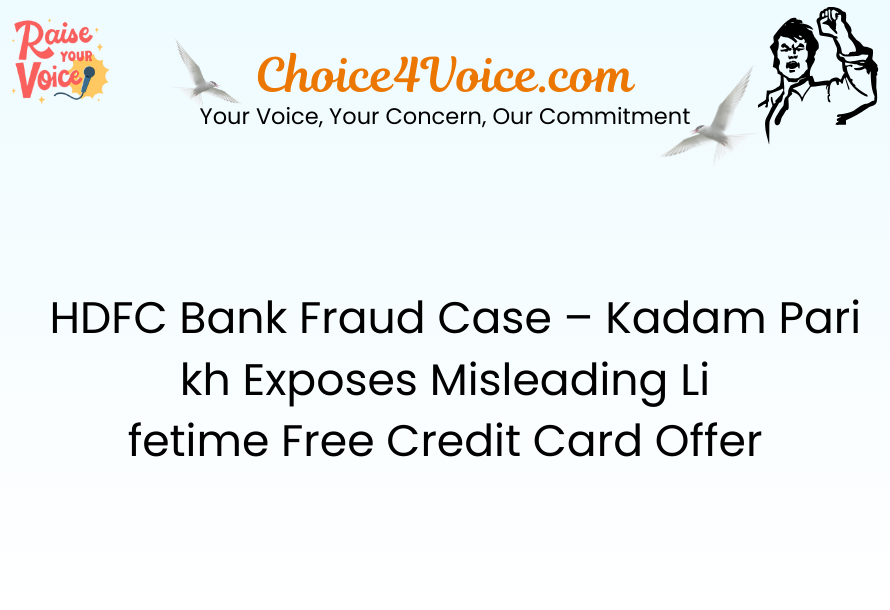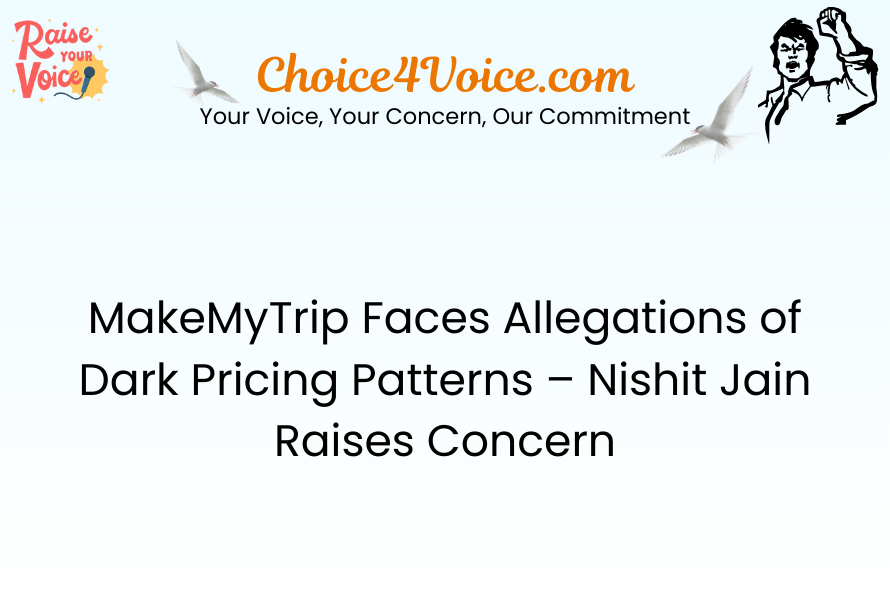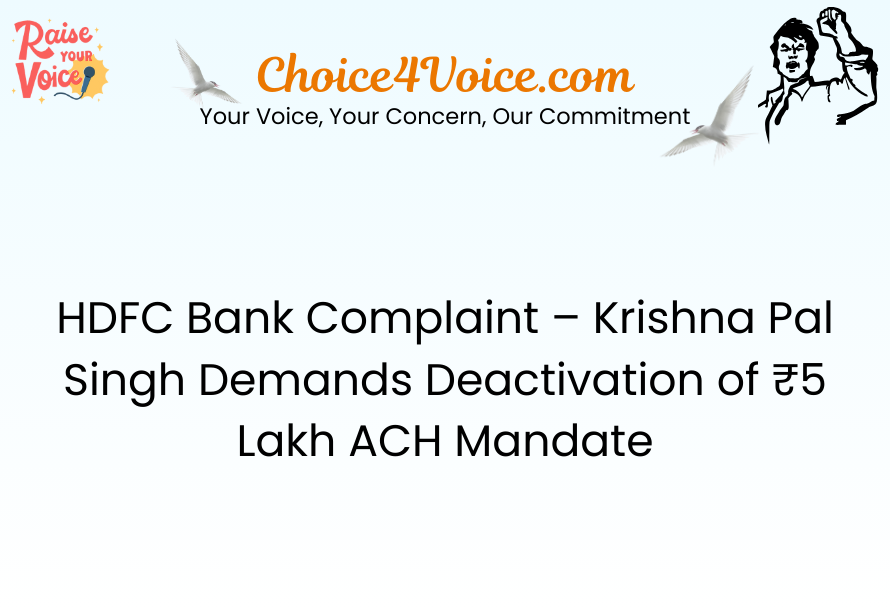Kadam Parikh has raised a serious complaint against HDFC Bank, alleging fraud in its “Lifetime Free” Freedom RuPay Credit Card offer. Despite advertisements and proof of the Lifetime Free claim, the bank issued a paid card. Read the full case, complaint details, and what actions consumers can take if they face similar fraud.
Note: If this issue is resolved, the concerned brand or the complainant may contact us at support@choice4voice.com. After proper verification, we will either update this article as “Resolved” or delete it, ensuring fairness to both parties.
Complaint Summary
| Detail | Information |
|---|---|
| Complainant Name | Kadam Parikh |
| Designation | Lead AI/ML Engineer |
| Company/Brand | HDFC Bank |
| Product/Service | Freedom RuPay Credit Card |
| Complaint Type | Misleading Advertisement / Fraudulent Practices |
| Issue Date | August 2025 |
| Issue Description | HDFC Bank advertised a “Lifetime Free Credit Card” through emails and its official website. However, after approval, the bank issued a paid card instead. Despite providing proof (screenshots), the bank’s customer care refused to resolve the issue. |
| Resolution Demanded | Conversion of card to Lifetime Free as advertised OR RBI Ombudsman escalation. |
| Original Source | LinkedIn Post by Kadam Parikh |
Detailed Complaint Explanation
Kadam Parikh, a Lead AI/ML Engineer, recently applied for the HDFC Bank Freedom RuPay Credit Card.
According to his statement:
- He received multiple promotional emails from HDFC Bank highlighting that the Freedom RuPay Card is Lifetime Free.
- Even the application page on the official HDFC Bank website displayed the Lifetime Free offer, for which he kept screenshots as evidence.
- However, when the credit card was delivered, it was not Lifetime Free but a paid card with annual charges.
- On contacting HDFC Bank’s customer care, he was informed “nothing can be done”, which is highly unprofessional and misleading.
This incident is a clear violation of consumer trust and advertising ethics. It also qualifies as a potential case of misrepresentation and unfair trade practice under the Consumer Protection Act, 2019.
Why This Case is Important
- False Advertising: Banks are legally bound to honor the claims made in their promotions and advertisements.
- Consumer Exploitation: Customers trust official communication, and misleading them into financial commitments is unethical.
- Lack of Accountability: Customer care’s refusal to resolve the issue indicates negligence and lack of transparency.
- Industry-Wide Problem: Many banks advertise “Lifetime Free” cards but later impose hidden charges, making this a systemic problem in Indian banking.
Possible Legal and Regulatory Actions
If HDFC Bank fails to address this grievance, the complainant (and other affected consumers) can:
- File a Complaint with RBI’s Banking Ombudsman – for misrepresentation and unfair practices.
- Escalate to Consumer Court under the Consumer Protection Act, 2019 for compensation and accountability.
- Report to the Advertising Standards Council of India (ASCI) for misleading advertisements.
- Raise awareness on social platforms like LinkedIn, Twitter, and consumer forums to pressure the bank into corrective action.
Consumer Awareness: How to Protect Yourself
- Always save screenshots of any promotional offer before applying.
- Verify the terms & conditions on the bank’s official site and ask for written confirmation.
- If wrongly charged, immediately dispute the charges in writing and escalate through the bank’s grievance redressal system.
- If unresolved, file a case with RBI Ombudsman or the Consumer Forum.
Commonly Asked Questions (FAQs)
Q1. What does “Lifetime Free Credit Card” mean?
A Lifetime Free Credit Card means the cardholder does not need to pay any joining fee or annual fee throughout the card’s validity.
Q2. Can banks change the Lifetime Free offer after issuing the card?
No. If the bank advertised and approved a card as “Lifetime Free,” it must honor the commitment. Otherwise, it is false advertising.
Q3. What evidence should I keep if my card is wrongly charged?
Keep screenshots, emails, SMS confirmations, and statements showing the bank’s claim and charges imposed.
Q4. How do I complain about a false credit card offer?
Start by raising a complaint with the bank’s grievance redressal team. If unresolved within 30 days, escalate to the RBI Ombudsman.
Q5. Can I get compensation if I was misled by a bank?
Yes. Under the Consumer Protection Act, 2019, you can claim compensation for mental harassment and financial loss.
Q6. Is this problem limited to HDFC Bank?
No. Many banks advertise Lifetime Free cards and later impose charges. Consumers should be vigilant across all banks.
Q7. What is the RBI Ombudsman scheme?
It is a free platform provided by the RBI where consumers can file complaints against banks for unfair practices.
Q8. How can I cancel a credit card if I don’t want to pay annual fees?
You can raise a cancellation request via net banking, customer care, or branch visit. Ensure you get a written closure confirmation.
Q9. Can I take legal action against a bank for misleading offers?
Yes. You can approach the Consumer Forum for compensation and to hold the bank accountable.
Q10. Does ASCI take action against misleading bank ads?
Yes. The Advertising Standards Council of India (ASCI) regulates misleading advertisements, including those by banks.
Q11. What are the risks of continuing with a paid card instead of Lifetime Free?
You may end up paying annual fees, hidden charges, and renewal fees, which were never part of the original promise.
Q12. How long does RBI Ombudsman take to resolve cases?
Generally, complaints are resolved within 90 days.
Q13. Can a bank deny resolving a complaint saying “nothing can be done”?
No. Every bank is mandated to have a grievance redressal mechanism. Customers can escalate if denied.
Q14. Are Lifetime Free Credit Cards common in India?
Yes, many banks offer them as promotional products. However, misrepresentation is also common.
Q15. Is HDFC Bank legally accountable in this case?
Yes. If evidence supports Kadam Parikh’s claim, the bank may face action from RBI, ASCI, and consumer courts.
Q16. What should customers do if wrongly billed for annual fees?
Raise a billing dispute immediately and escalate through proper channels.
Q17. Can social media pressure help in resolving banking complaints?
Yes. Public awareness often pushes banks to act faster to protect their reputation.
Q18. Does RBI take action on individual consumer complaints?
Yes. RBI Ombudsman addresses individual grievances free of cost.
Q19. Should customers trust Lifetime Free offers in the future?
Yes, but with caution. Always document proof before applying.
Q20. What’s the first step if my bank misleads me?
File a written complaint with the bank, keep acknowledgment, and escalate if unresolved.
✅ This case highlights the urgent need for transparency and accountability in banking. Consumers like Kadam Parikh are standing up against misleading offers, and more awareness will help prevent exploitation of unsuspecting customers.
Choice4Voice.com Is Here to Help You
If you are facing a similar issue and would like our support in highlighting your concern, we are here to assist.
Simply write a LinkedIn post and tag our official page Choice4Voice.com
Submit your complaint directly : https://choice4voice.com/submit-your-complaint/
Our team will review and feature your case on our website to ensure it gets the attention it deserves.



